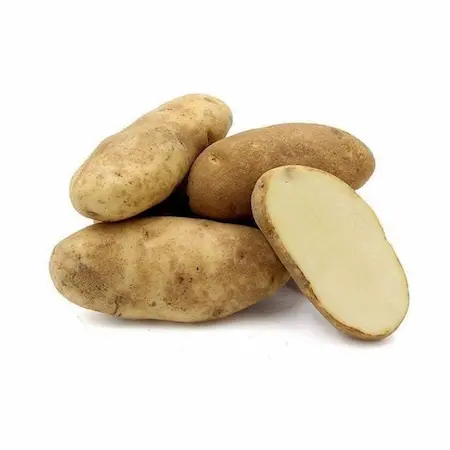Russets are Starchy potatoes. They are medium to large, slightly flattened oval or oblong, with a light to medium brown (russet brown) color. They have sand-paper-like rough netted skin and white or yellow flesh, and their flavor is earthy and mild. Russets have fewer eyes on the skin than other potatoes making them visually appealing.
Russets are available year-round, but the peak season is from early winter to late spring. They can be stored for up to a month in a cool, dry, dark place. The container should be well-ventilated so that moisture does not collect. Keeping potatoes in the dark or covered prevents sprouting.
Are Russet Potatoes Healthy?
Russet potatoes are an excellent source of Vitamin C, B6, thiamin (B1), niacin (B3), magnesium, iron, calcium, and fiber. They contain more potassium than a banana. They have complex carbohydrates that provide energy to muscles and fuel to the brain. Niacin lowers Cholesterol and B-6 synthesizes serotonin, which regulates mood, sleep, and appetite.
Leaving the skin on potatoes is healthier as they contain many nutrients. Skins have more iron (88%), and flesh and skin together provide 80% of the daily potassium and 75% of the daily magnesium needed for good health.
Iron transports oxygen makes neurotransmitters and regulates the growth of cells that fight pathogens, thus supporting the immune system. Potassium and magnesium carry electrical charges that aid muscle contraction and stimulate nerve transmission. Potassium helps to maintain a regular heartbeat, and magnesium helps to lower blood pressure. Skins also contain phytochemicals that potentially protect from heart disease and cancer.
Boil, steam, bake, grill, or microwave whole, unpeeled Russet potatoes, cool them in the fridge, and warm them again before eating. When cooked, the starch in potatoes swells and becomes gelatinous. Refrigerating converts some of this starch to resistant starch. Repeating the process helps to create more resistant starch.
This is a great way to consume complex carbohydrates with a lower Glycemic Index (GI) and higher starch resistance. They will keep you full longer and burn more glucose during digestion to aid health and weight loss. Resistant starch (not easily digested) feeds the good bacteria in your gut, slows sugar absorption, and stabilizes blood sugar levels after meals.
Russet Potatoes for Diabetes, Arthritis, Cholesterol, Kidneys
People with Diabetes need to be mindful of carbohydrate intake. The American Diabetes Association (ADA) does recommend potatoes as part of a healthy diet as the complex carbohydrates in potatoes take longer to break down.
Cooking potatoes in ways that lower their GI and build starch resistance (explained above) allows one to include them in a healthy diet for those with Diabetes. Whole-boiled or steamed potatoes are best as they have low sugar, fat, and salt. Potato salads with low-fat dressing and healthy toppings are a good option too.
People with Diabetes should avoid fried and mashed potatoes. Russet potatoes have a high GI and medium Glycemic Load (GL), so their use should be limited. Nicola, Carisma, or Sweet potatoes are better options.
Anecdotal reports say that nightshades aggravate inflammation and Arthritis due to the solanine they contain. Though this is true for some, there is no scientific evidence to back it. If you have doubts, eliminate them from your diet for a couple of weeks and then slowly reintroduce them. If they trigger pain, leave them out.
Reducing Cholesterol levels is a way to mitigate Arthritis pain. A Mediterranean Diet helps one reduce cholesterol and maintain better health and weight.
The American Heart Association (AHA) recommends eating foods with more soluble fiber to lower LDL or bad cholesterol. Potatoes contain both soluble and insoluble fiber. The soluble fiber binds to bile acids and brings down cholesterol.
Eating potatoes with their skins intact (Russets are good) helps to meet the daily fiber requirements of the body, keep down cholesterol, and lower blood pressure and inflammation.
Those with Chronic Kidney Disease (CKD) are advised to limit potato consumption due to their high potassium content. However, a large percentage of potassium can be leached out of potatoes, so renal patients can eat them. It involves soaking potatoes after cooking and recooking them.
Studies on potassium content have found that mean potassium content is lowest in Idaho potatoes after they have been cut and double cooked.
Are Russet Potatoes Good for Weight Loss?
Potatoes and their skins are high in fiber (around 7gms) and protein (3gms) hence healthy and aiding in weight loss. The B vitamins in potatoes activate enzymes that help metabolism and energy production.
Blue/Purple potatoes have high antioxidant content (four times that of white potatoes) and are best for weight loss. Whites, Reds, and Russets are nutrient-dense and low-calorie, aiding weight loss. Researchers at McGill University have found that the high concentration of polyphenols in potatoes could be a key to keeping the pounds off. Since they are full of slow-burning complex carbs, they tend to make you feel full and satiated longer, thus aiding the weight loss process.
I am Anand, and I am a business owner and consultant in my day job. I have spent years studying what’s inside the products we buy. ‘Feedrer’ is a wordplay on you-know-who and talks about all things food.
